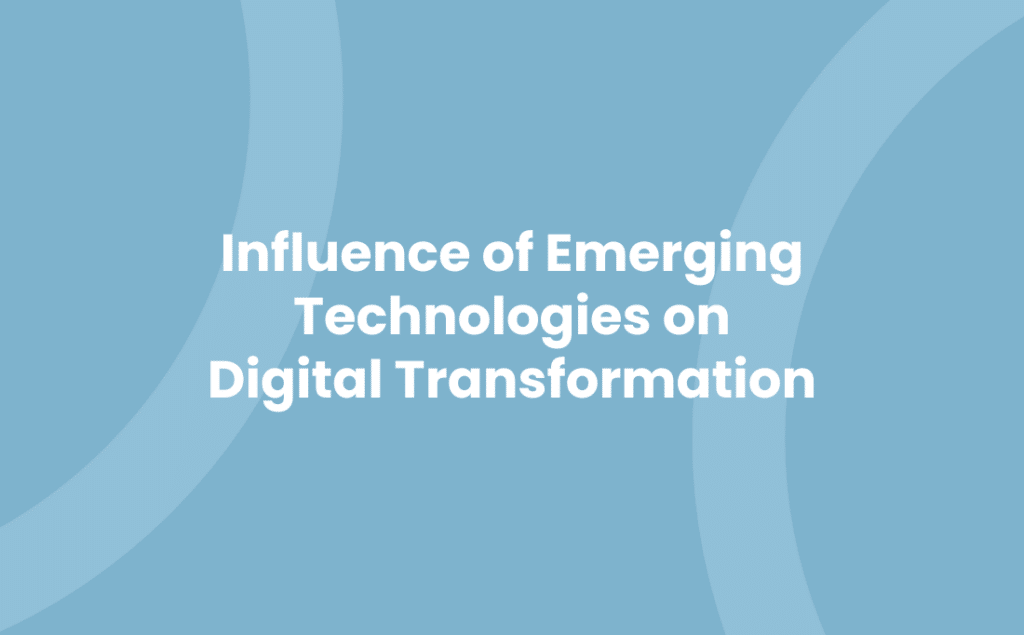In the fast-paced world of technology, you’re constantly bombarded with new terms and buzzwords. One such phrase that’s been making the rounds is ‘Digital Transformation’. But what exactly does it entail? It’s more than just a fancy tech jargon; it’s a revolution in how businesses operate and succeed in the digital age.
As you delve deeper into this topic, you’ll uncover the emerging digital technologies powering this transformation. From AI to blockchain, these aren’t just trends, but tools that are reshaping industries and redefining customer experiences. Stay tuned as we navigate through the exciting realm of digital transformation and its game-changing technologies.
Understanding Digital Transformation
Digital transformation isn’t just about adopting the latest technologies. It’s about leveraging digital technologies to alter existing or create new business processes and customer experiences, bringing forth the change in the operational structure of an organisation. The end goal is clear – to adapt to changing business scenarios and market requirements.
At its core, digital transformation encapsulates the integration of digital technology into all aspects of human society. It’s a comprehensive process that requires changes to people, systems, and operating models. Identifying, understanding, and applying emerging tech digital trends play a crucial role in this transformative journey.
Three core components influence the success of the digital transformation: technology, data, and process.
- Technology: Top on the list are emerging technologies like Artificial Intelligence (AI), big data, Internet of Things (IoT), and blockchain. Advanced technology not only speeds up the process but also enhances the overall customer experience.
- Data: Collecting, processing, and utilising data smartly is pivotal. It allows companies to make informed decisions and enhance customer engagement.
- Process: An important aspect often overlooked. Transforming processes involves identifying redundant tasks, optimising workflows, and adopting faster, more efficient processes.
Avoid considering digital transformation as a one-time project. It’s a continuous cycle of evolution as long as technology keeps advancing. Companies must adapt to this continuous cycle to stay ahead in the race.
Lastly, remember, digital transformation gets easier when there’s a clear direction and understanding of what’s feasible and what’s not. Keep your goals inline and welcome the wave of digital transformation wholeheartedly.
The Emergence of Digital Transformation Technologies
Digital transformation creates a nexus of cutting-edge technologies, ever-evolving tools designed to digitise business processes and enhance customer experiences. As digital transformation unfolds as an ongoing process, let’s explore some emerging digital transformation technologies.
Prime on the list is Artificial Intelligence (AI). AI applies machine learning methods to make machines smarter, allowing them to operate independently, without human intervention. With AI, businesses improve efficiencies and generate innovative solutions.
Close on AI’s heels, Big Data stands as another influential actor in the digital age. Sifting volumes of data, it extracts valuable insights, contributing decisively to data-informed decision-making in your business.
Continuing the march of the digital pioneers, the Internet of Things (IoT) networks multiple devices, facilitating real-time data sharing. Whether managing supply chains or tracking inventory, IoT helps you stay informed and agile in your operations.
Modern digital technologies extend to Blockchain as well. Blockchain transforms how you exchange data, establishing secure and transparent transactions.
These digital transformation technologies, amongst many, streamline operations, improve efficiencies, and pioneer innovative solutions in your business. Harnessing these emerging tech digital assets positively influences your competitive edge.
Ably navigating the digital landscape requires comprehension of these tools and their potential. Deploying digital avenues creatively and strategically, you optimise their benefits. However, adapting to a digitally transformed ecosystem calls for simultaneous reassessment of people, processes, and operations.
Grasp these digital transformation technologies; they’re radically reshaping the business sphere. Engagement with these emerging wanderers of the digital realm secures your business sustainability, flexibility, and competitiveness in a digital world that’s in continual flux. With each advancing wave, you’ll not only embrace but also create and lead digital transformation. The next step in your digital journey is but just the click of a button away.
Detailing Key Digital Transformation Emerging Technologies
Delving deep into important, front-line technologies is imperative for any digitally transforming business. This not only upscales your understanding of the landscape but also provides better clarity on what suits your specific requirements.
Artificial Intelligence (AI), seen by many as the cardinal driving force of many emerging technologies, undoubtedly takes the top position. AI, particularly in forms such as Machine Learning, streamlines business processes by learning patterns and making data-driven predictions. An example of AI’s application broadly includes automating customer service through chatbots.
Big Data is another initiative that businesses are increasingly incorporating. It involves analysing large volumes of data to uncover hidden patterns, correlations and other insights. With today’s technology, it’s possible to analyse your data and get answers from it almost immediately. For instance, a retail company might utilise data to understand purchasing behaviours and trends.
The Internet of Things (IoT), involves a network of physical objects that are connected to the internet. This technology serves to increase the efficiency of everyday tasks and enhance data collection capabilities. A good use-case of IoT can be seen in supply chain management where sensors on goods provide real-time tracking, hence improving efficiency.
Lastly, Blockchain stands out as another emerging technology. It’s not just about cryptocurrencies, this innovative tech offers security that’s useful in many other ways. With its decentralised nature, it ensures transparency and reduces data tampering risks. For example, in finance, it holds promise to speed up and simplify the payment processing system, increasing transparency throughout the process.
With this in-depth understanding of key digital transformation technologies, you’re in a prime position to navigate the digital revolution. Pay heed to these emerging tech digital transformations, prioritise your needs, and take the leap towards powering your organisation’s evolution with these innovations.
Challenges in Adopting Emerging Technologies for Digital Transformation
Incorporating cutting-edge tech into your digital transformation can appear as a Herculean task. Though brimming with potential, these technologies present a host of obstacles.
Foremost, acquiring relevant skill sets is a fundamental hurdle. Your workforce can often lack familiarity with emerging digital transformation technologies like AI and IoT. Arranging training sessions and embracing a culture of continued learning becomes imperative for bearing fruit with such advancements.
Secondly, integration hurdles can hamper the smooth fusion of emerging technology into your existing systems and processes. Balancing the legacy systems and new technology, while not causing disruptions or losses in productivity, often feels like walking on a tightrope. For instance, integrating Blockchain for enhanced security may require a substantial restructuring of your existing data management systems.
Thirdly, concerns over data privacy and cybersecurity may evoke apprehension. As you dive deeper into the realm of Big Data and AI, handling vast amounts of data responsibly is crucial. Established databases could be exposed to new vulnerabilities. Mitigating these threats requires robust data governance and cybersecurity measures.
Lastly, cost implications cannot be overlooked. Investments into advanced tech come with hefty price tags. From acquiring the technology, to training personnel, to setting up necessary infrastructure, every phase incurs expenses. Devising comprehensive budget plans and exploring return on investment (ROI) possibilities eases this financial burden.
Whether it’s staying updated with rapid tech advancements or addressing the change management within your organisation, these hurdles, though challenging, are not insurmountable. Being prepared and attentive aids you in leveraging the true potential of emerging technologies. Remember, the path of digital transformation pivots around a clear strategy and determination to adapt. So, embrace the change and forge ahead into the future of digitised business.
The Influence of Emerging Technologies on Business Models
The Influence of Emerging Technologies extends beyond operational efficiencies; it fundamentally reshapes business models. For instance, the integration of AI and machine learning enables predictive analytics, allowing businesses to anticipate customer needs and tailor services accordingly. Similarly, blockchain technology introduces new paradigms in trust and transparency, facilitating decentralized business models that were previously unfeasible. Embracing these technologies not only optimizes existing processes but also opens avenues for innovative revenue streams and value propositions.
Frequently Asked Questions
What are emerging digital technologies in the context of digital transformation?
Emerging digital technologies refer to new, innovative tools such as Artificial Intelligence, Blockchain, IoT, and Big Data that are reshaping the way businesses operate. These technologies play a vital role in enabling digital transformation.
How does the influence of emerging technologies affect business operations?
The influence of emerging technologies streamlines workflows, improves data-driven decision-making, enhances customer experiences, and creates more agile and efficient business processes.
Why is Artificial Intelligence considered a key driver in digital transformation?
AI enables automation, predictive analytics, and smarter customer service, making it a cornerstone of the influence of emerging technologies on digital transformation.
What are the challenges of implementing emerging digital technologies?
Common challenges include lack of in-house expertise, resistance to change, integration issues, and high implementation costs. Businesses need strategic planning to overcome these barriers.
How can businesses stay ahead with emerging digital technologies?
By continuously learning, investing in the right tools, and staying adaptable, businesses can harness the influence of emerging technologies to drive innovation and maintain a competitive edge.


